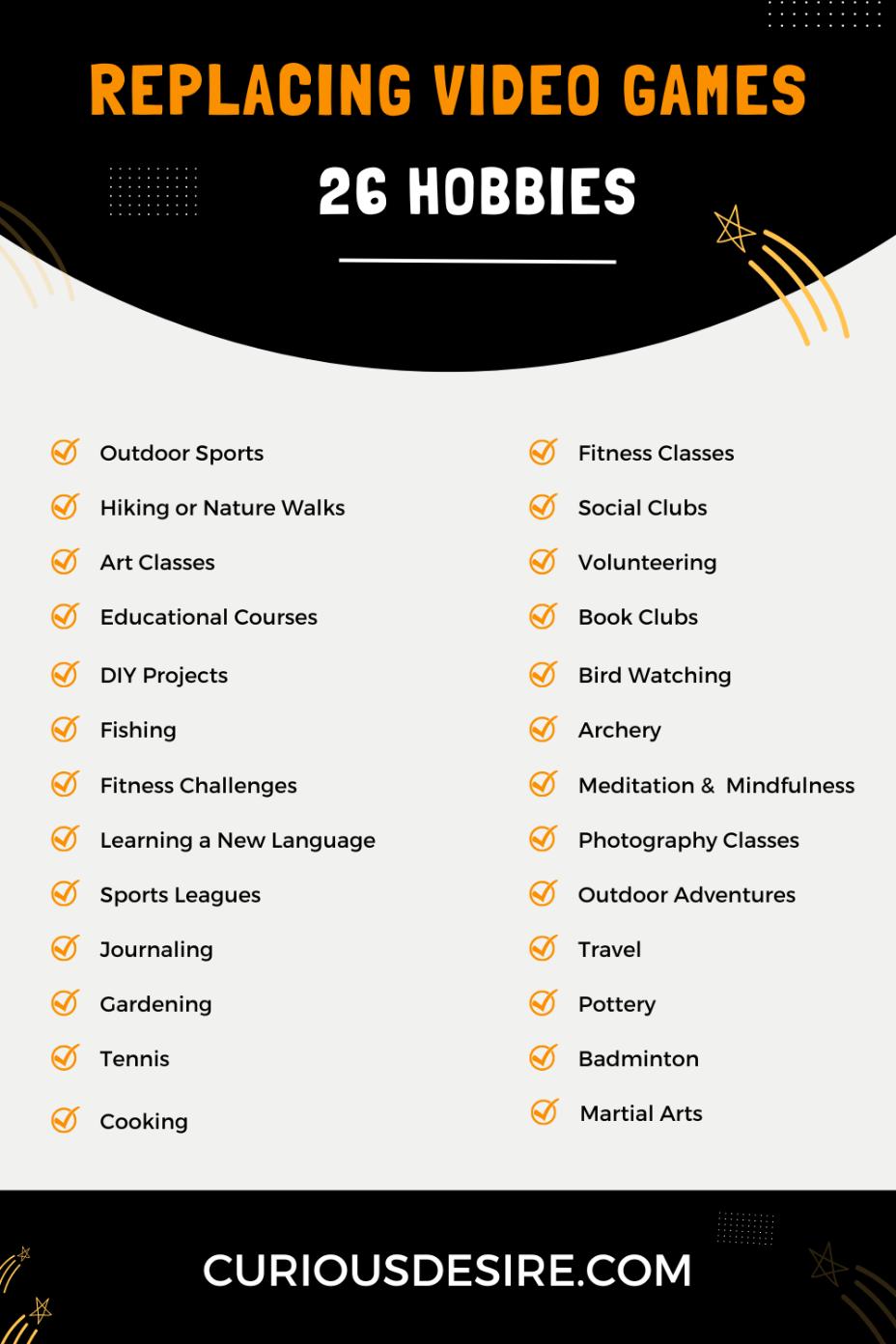Ever get tired of the same old video game routine? Well, guess what? There’s a whole world out there beyond those screens, and we’ve got some fantastic hobbies list ready for you!
Check out these amazing hobbies that you can adopt to have real-life fun and excitement. Let’s get started!
Here are the top 5 hobbies to replace video games:
- Outdoor Sports
- Hiking or Nature Walks
- Joining Book Clubs
- Bird Watching
- Fitness Challenges
[toc]

Hobby 1: Outdoor Sports
Engaging in outdoor sports like soccer or basketball provides a fantastic alternative to video games.
Not only does it offer a physical outlet, promoting a healthier lifestyle, but it also introduces you to the joy of teamwork and competition.
The social aspect of playing sports can help build new friendships and create a supportive community.
Regular physical activity contributes to improved mood and energy levels, which are essential for breaking away from the sedentary nature of gaming.
Hobby 2: Fitness Classes
Joining fitness classes at a local gym or online, offers a structured and enjoyable way to stay physically active.
These classes provide a variety of workouts, from high-intensity sessions to more meditative practices like yoga.
The group setting provides a sense of camaraderie, making the experience more social and enjoyable.
Setting fitness goals and tracking your progress can create a sense of accomplishment, similar to leveling up in a video game.
Moreover, the positive impact on your physical health can lead to increased self-esteem and motivation, making it easier to distance yourself from the virtual world of gaming.
Hobby 3: Hiking or Nature Walks
Taking walks in nature, like hiking, gives you a nice break from video games. Being in nature helps calm your mind, especially when games can be too much.
Hiking is good for your body and gives your mind a break, making you feel less stressed and better overall.
Nature is full of surprises – beautiful views, and sometimes, you might even see animals. It’s like the adventure you find in games.
If you make walks in nature a regular thing, you’re not just avoiding screens; you’re also getting to know and appreciate the real world better.
Hobby 4: Social Clubs
Joining social clubs centered around shared interests opens the door to meaningful connections outside the world of gaming.
Whether it’s a book club, photography group, or volunteering organization, these clubs provide a sense of belonging and purpose.
Socializing with others who share common interests helps break the isolation that can come with excessive gaming.
Hobby 5: Art Classes
Joining art classes, be it painting, drawing, or sculpture, gives you a way to be creative, which is quite different from just playing games.
Making real, visual things that express what you feel or think gives you a great sense of achievement and helps you learn more about yourself.
Art classes also help you use your time in a more organized and positive way, instead of spending too much time in front of a screen.
With art, you not only pick up a valuable skill but also discover a therapeutic and fulfilling way to be creative, making you feel good inside.
Hobby 6: Volunteering
Getting involved in volunteer work is a powerful way to shift your focus from virtual achievements to real-world impact.
Volunteering allows you to contribute to a cause you’re passionate about and connects you with a community of like-minded individuals.
The sense of purpose and fulfillment derived from helping others can be a powerful motivator, countering the instant gratification often sought in gaming.
Hobby 7: Educational Courses
Taking classes to learn new things is a great way to spend your time. Learning skills not only teaches you more but also makes your brain work differently compared to playing games.
Classes have a plan, so you feel like you’re making progress, kind of like when you achieve something in a game.
And the cool part is, the things you learn can actually be useful in real life, helping you grow as a person and maybe even in your job.
By keeping up with learning new things, you’re not just replacing game time; you’re also keeping a curious and growing mindset.
Hobby 8: Book Clubs
Reading isn’t just a fun way to pass the time; it also makes your brain sharper and lets your imagination run wild.
The shared experience of reading and discussing books with others builds a sense of community and provides a social outlet.
Book clubs encourage regular reading habits, offering a healthier alternative to the extended screen time associated with gaming.
Hobby 9: DIY Projects
Do-it-yourself (DIY) projects offer a hands-on and creative outlet, replacing the passive engagement of video games with tangible, real-world results.
The problem-solving skills required in DIY parallel the cognitive challenges found in gaming, offering a more satisfying alternative.
Engaging in practical and constructive activities also helps break the cycle of screen time, promoting a healthier balance between virtual and real-world experiences.
Hobby 10: Bird Watching
Bird watching is not just about birds; it’s a peaceful and educational way to connect with nature.
When you observe and identify different bird species, it feels like you’re on a real-life adventure, just like exploring virtual worlds in games.
Bird watching gets you outdoors, promoting a healthier and more active lifestyle. Unlike the quick satisfaction of gaming, bird watching teaches patience and a more mindful way to enjoy your free time.
Joining local birding groups or communities adds a social side to the hobby, giving you real-world connections instead of just online interactions.
Hobby 11: Fishing
Hobby 12: Archery
Trying archery is not just a fun way to be active but also an amazing alternative to video games. Archery needs precision, which is like the strategic thinking you do in games.
It’s a focused and goal-oriented activity that feels satisfying. When you do archery, you also need to be mindful and concentrate.
Each shot needs your focus and control, making it a bit like a real-life video game.
So, by giving archery a go, you not only stop staring at screens but also learn a skill that mixes precision and focus.
Hobby 13: Fitness Challenges
Setting personal fitness goals and tracking your progress not only replaces the time spent gaming but also transforms physical activity into a dynamic and rewarding pursuit.
The act of defining achievable fitness objectives creates a sense of purpose, much like the quests and missions in video games.
As you work towards your goals, whether it’s improving endurance, building strength, or achieving a specific milestone, the sense of accomplishment becomes a powerful motivator.
Hobby 14: Meditation and Mindfulness
Adding meditation and mindfulness to your daily routine and your hobby is like taking a break for your mind, especially if you spend a lot of time gaming.
When you sit quietly and pay attention to your breath, it helps you stay focused on the present moment instead of being in virtual worlds all the time.
Studies show that meditation is great for reducing stress and making your mind feel more balanced and relaxed.
On the other hand, mindfulness is a useful tool. It helps you break the habit of playing games too much and teaches you to enjoy your free time more healthily.
Hobby 15: Learning a New Language
Learning a new language can be a fun and interesting way to challenge your mind instead of playing video games.
When you learn a language, you engage your memory, problem-solving skills, and ability to recognize patterns. These mental challenges are similar to the ones you find in gaming.
Moreover, learning a new language opens up opportunities for communication and exploring different cultures, giving your efforts real-world significance.
You can use language learning apps, take classes, or join language exchange meetups to have a structured and interactive experience in your linguistic journey.
By incorporating language learning into your routine, you not only replace gaming but also improve your cognitive abilities. Plus, you gain a valuable skill that can be useful in various aspects of life.
Hobby 16: Photography Classes
Trying out photography can be a great way to have fun and be creative instead of playing video games. It allows you to capture real moments in the world around you.
Photography classes provide structured learning experiences, helping you understand the technical aspects of composition, lighting, and storytelling through images.
Photography also helps you look at the world in a new way, making you more mindful and aware of your surroundings.
When you spend time on photography, you not only stop playing games, but you also develop a useful skill. Plus, you create a photo album of your life and the things you’ve experienced.
Hobby 17: Sports Leagues
Playing in a local sports league is a great way to have fun and be part of a team instead of playing video games alone.
You can choose sports like soccer or basketball, where you get to move around, talk to others, and feel like you’re part of a group.
In a sports league, you have regular practices and games, which is different and healthier from just sitting in front of a screen all day.
Hobby 18: Outdoor Adventures
Trying activities like rock climbing, kayaking, or zip-lining provides an adrenaline-filled alternative to the virtual adventures found in video games.
Outdoor adventures not only replace screen time with real-world excitement but also offer physical challenges and a connection with nature.
The unpredictability of outdoor activities, from navigating a rock face to paddling down a river, mirrors the sense of exploration in gaming.
Engaging in outdoor adventures requires physical effort and skill development, promoting a healthier and more active lifestyle.
Hobby 19: Journaling
Reflecting on your thoughts and experiences through regular journaling not only replaces the time spent in virtual worlds but also offers a therapeutic and self-reflective practice.
Journaling provides an outlet for self-expression, helping you process emotions, set goals, and document personal growth.
If you make writing in a journal a regular habit, it’s not just about stopping gaming. It becomes a useful tool to learn more about yourself and think about things.
Hobby 20: Travel
Going to new places and experiencing different cultures through travel is a great way to replace the time you spend playing video games.
It’s not just a change from screens; it also changes the way you see things. Travel helps you learn about customs, traditions, and how people live in different places.
It’s like an adventure – from finding your way around new streets to trying local food, it’s exciting just like exploring video game worlds.
Hobby 21: Gardening
Exploring gardening can be a wonderful alternative to video games. Gardening is a happy and rewarding way to make you feel good about yourself.
Taking a break from screens and enjoying nature is easier with gardening. To begin your gardening journey, grab a small plant or some seeds, a pot, and soil.
Instead of spending time playing games, you can explore different gardening techniques for better plant growth. You can also learn about various plants and their species, making your hobby even more interesting.
Gardening gives you a chance to relax, be creative, and connect with the natural world.
Hobby 22: Pottery
Trying out pottery is a calm and creative break from the quick world of video games. With pottery, you can express yourself by working with clay, and it feels very relaxing.
It’s a good way to take a break from screens. You can start your pottery journey by joining a beginner’s class or getting a small pottery kit.
Have fun experimenting with molding and shaping the clay to make your own special and meaningful creations.
Hobby 23: Tennis
Another way to replace video games is by going out and playing tennis, either at clubs or with friends. This active sport not only gives you good exercise for your heart but also makes you more agile.
It’s also a great way to make social connections. It’s a lively hobby that helps you stay physically fit, and focused, and live a healthy life.
To start, just get a tennis racket, find a nearby court, and enjoy the simple pleasure of hitting the ball back and forth.
Hobby 24: Badminton
Picking badminton as a fun activity is another lively and active option. Badminton is fast-paced, requires skill, and is great for staying active.
Playing with friends in singles or doubles is exciting. This lively hobby is not just good for your body; it also gives you a break from screen activities.
Hobby 25: Cooking
Trying out cooking can be another enjoyable hobby. Cooking involves preparing and making delicious meals.
It’s a creative and hands-on activity where you can experiment with different ingredients and flavors. Cooking not only provides a tasty reward but also allows you to share different meals with others.
It’s a practical skill that brings joy and a sense of accomplishment, offering a delightful break from virtual screens.
Hobby 26: Martial Arts
Starting martial arts is a different and disciplined hobby compared to playing video games. Whether it’s karate, judo, or taekwondo, martial arts teach things like discipline, focus, and keeping your body fit.
Training sessions not only make you feel proud but also help you grow as a person and become mentally strong.
Martial arts are a complete hobby, promoting your health, self-defense skills, and a balanced life.
To begin your martial arts journey, think about joining a local class where you can slowly improve in skill and understanding yourself.
Hobbies To Replace Video Games – FAQs
1. What is a good replacement for video games?
Engaging in alternative hobbies or activities can be a good replacement for video games.
Consider activities such as reading, playing a musical instrument, exercising, gardening, or pursuing creative hobbies like drawing or writing.
2. What to do when you can’t play video games?
Explore other forms of entertainment or relaxation. You can watch movies, read books, go for a walk, socialize with friends, or learn a new skill.
Finding diverse activities can help broaden your interests beyond video games.
3. Are video games a healthy hobby?
In moderation, video games can be a healthy hobby. They can provide entertainment, relaxation, and even cognitive benefits.
However, excessive gaming may lead to negative consequences, so balance is key.
4. Is gaming an addiction or a hobby?
Gaming can be both a hobby and, in some cases, an addiction. It becomes problematic when it interferes with daily life, responsibilities, and overall well-being.
Moderation and self-awareness are crucial in distinguishing between a hobby and an addiction.
5. Are video games good or bad for your brain?
Research suggests that certain types of video games can have cognitive benefits, such as improving problem-solving skills and spatial awareness.
However, excessive gaming or inappropriate content may have negative effects. It’s essential to choose games wisely and play in moderation.
6. Are games bad for memory?
Some video games, particularly those that involve strategy and memory recall, can enhance cognitive functions, including memory.
However, like any activity, excessive gaming or inappropriate game choices may negatively impact memory and cognitive health.
7. Do video games have negative effects?
Excessive gaming or inappropriate content in video games can lead to negative effects, including impaired social skills, decreased physical activity, and potential addiction.
It’s important to be mindful of the content and time spent gaming.
8. Are video games bad for your eyes?
Extended periods of screen time, including gaming, can lead to eye strain and discomfort.
To mitigate this, take breaks, follow the 20-20-20 rule (every 20 minutes, look at something 20 feet away for at least 20 seconds), and ensure proper lighting and screen settings.
9. Are video games a healthy habit?
In moderation, video games can be a healthy habit, providing entertainment, stress relief, and even cognitive stimulation.
The key is to balance gaming with other activities, ensuring a well-rounded lifestyle.
10. Can video games be healthy?
Yes, video games can be healthy when played in moderation. Some games promote problem-solving, strategic thinking, and social interaction.
However, it’s essential to choose age-appropriate games and not let gaming interfere with other aspects of life.
11. Why is video gaming a good hobby?
Video gaming can be a good hobby because it offers a range of benefits, including entertainment, cognitive stimulation, and social interaction.
It allows players to unwind, immerse themselves in different worlds, and even develop skills such as teamwork and critical thinking.
12. Are video games mentally healthy?
In moderation and with appropriate content, video games can contribute to mental well-being.
They can provide a sense of accomplishment, social connection, and relaxation.
However, excessive gaming or engaging in violent and inappropriate games may have adverse mental health effects.



